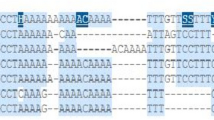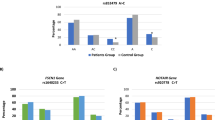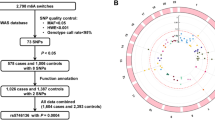Abstract
Objectives
Oral cancer is the most common head and neck malignancy, and it is associated with a high recurrence rate and lymph node metastasis potential. YKL-40, also known as chitinase-3-like protein 1 (CHI3L1), is a secreted glycoprotein that serves as a biomarker in several diseases. It also plays a crucial role in regulating many characteristics of cancer, such as cell growth, migration, anti-apoptosis, and angiogenesis. Accumulating evidence supports the link between single-nucleotide polymorphisms (SNPs) and oral cancer, but no report on the association between CHI3L1 polymorphisms and oral cancer is available. Thus, the present study evaluated the contribution of CHI3L1 SNPs to oral cancer susceptibility and clinicopathology.
Materials and methods
This study recruited a total of 2362 subjects, comprising 1190 healthy male controls and 1172 male patients with oral cancer. Allelic discrimination of the CHI3L1 polymorphisms − 1371 G>A (rs6691378), − 247 G>A (rs10399805), − 131 C>G (rs4950928), and + 2950 T>C (rs880633) was assessed through real-time polymerase chain reaction.
Results
We detected a significant association of rs10399805 and rs6691378 with the risk of oral cancer (AOR, 1.537; 95% CI, 1.089–2.168; p = 0.014; AOR, 1.561; 95% CI, 1.131–2.156; p = 0.007, respectively) after adjustment for three potential confounders, smoking, betel nut chewing, and alcohol consumption. Moreover, we found that oral cancer patients carrying the homozygous A/A genotype of the rs10399805 (p = 0.035) or rs6691378 polymorphism (p = 0.023) showed a significantly lower risk of lymph node metastasis. Moreover, according to the Genotype-Tissue Expression database, the rs10399805 and rs6691378 polymorphisms in the promoter region were associated with decreased levels of CHI3L1 mRNA.
Conclusions
In conclusion, we found that the homozygous mutant allele of rs10399805 and rs6691378 appeared to have significantly lower risk of lymph node metastasis and associated with its mRNA levels in oral cancer.
Clinical relevance
The CHI3L1 polymorphisms rs10399805 and rs6691378 may act as biomarkers for predicting lymph node metastasis in oral cancer patients.

Similar content being viewed by others
References
Okura M, Aikawa T, Sawai NY, Iida S, Kogo M (2009) Decision analysis and treatment threshold in a management for the N0 neck of the oral cavity carcinoma. Oral Oncol 45:908–911. https://doi.org/10.1016/j.oraloncology.2009.03.013
Su SC, Lin CW, Liu YF, Fan WL, Chen MK, Yu CP, Yang WE, Su CW, Chuang CY, Li WH, Chung WH, Yang SF (2017) Exome sequencing of oral squamous cell carcinoma reveals molecular subgroups and novel therapeutic opportunities. Theranostics 7:1088–1099. https://doi.org/10.7150/thno.18551
Tsantoulis PK, Kastrinakis NG, Tourvas AD, Laskaris G, Gorgoulis VG (2007) Advances in the biology of oral cancer. Oral Oncol 43:523–534. https://doi.org/10.1016/j.oraloncology.2006.11.010
Radoi L, Luce D (2013) A review of risk factors for oral cavity cancer: the importance of a standardized case definition. Community Dent Oral Epidemiol 41(97–109):e78–e91. https://doi.org/10.1111/j.1600-0528.2012.00710.x
Ram H, Sarkar J, Kumar H, Konwar R, Bhatt ML, Mohammad S (2011) Oral cancer: risk factors and molecular pathogenesis. J Maxillofac Oral Surg 10:132–137. https://doi.org/10.1007/s12663-011-0195-z
Olaussen KA, Dunant A, Fouret P, Brambilla E, Andre F, Haddad V, Taranchon E, Filipits M, Pirker R, Popper HH, Stahel R, Sabatier L, Pignon JP, Tursz T, Le Chevalier T and Soria JC (2006) DNA repair by ERCC1 in non-small-cell lung cancer and cisplatin-based adjuvant chemotherapy. N Engl J Med 355:983–991. doi: https://doi.org/10.1056/NEJMoa060570
Specjalski K, Jassem E (2011) YKL-40 protein is a marker of asthma. J Asthma: Off J Assoc Care Asthma 48:767–772. https://doi.org/10.3109/02770903.2011.611955
Kumagai E, Mano Y, Yoshio S, Shoji H, Sugiyama M, Korenaga M, Ishida T, Arai T, Itokawa N, Atsukawa M, Hyogo H, Chayama K, Ohashi T, Ito K, Yoneda M, Kawaguchi T, Torimura T, Nozaki Y, Watanabe S, Mizokami M, Kanto T (2016) Serum YKL-40 as a marker of liver fibrosis in patients with non-alcoholic fatty liver disease. Sci Rep 6:35282. https://doi.org/10.1038/srep35282
Rathcke CN, Vestergaard H (2009) YKL-40—an emerging biomarker in cardiovascular disease and diabetes. Cardiovasc Diabetol 8:61. https://doi.org/10.1186/1475-2840-8-61
Libreros S, Garcia-Areas R, Iragavarapu-Charyulu V (2013) CHI3L1 plays a role in cancer through enhanced production of pro-inflammatory/pro-tumorigenic and angiogenic factors. Immunol Res 57:99–105. https://doi.org/10.1007/s12026-013-8459-y
Francescone RA, Scully S, Faibish M, Taylor SL, Oh D, Moral L, Yan W, Bentley B, Shao R (2011) Role of YKL-40 in the angiogenesis, radioresistance, and progression of glioblastoma. J Biol Chem 286:15332–15343. https://doi.org/10.1074/jbc.M110.212514
Johansen JS (2006) Studies on serum YKL-40 as a biomarker in diseases with inflammation, tissue remodelling, fibroses and cancer. Dan Med Bull 53:172–209
Thongsom S, Chaocharoen W, Silsirivanit A, Wongkham S, Sripa B, Choe H, Suginta W and Talabnin C (2016) YKL-40/chitinase-3-like protein 1 is associated with poor prognosis and promotes cell growth and migration of cholangiocarcinoma. Tumour Biol : the journal of the International Society for Oncodevelopmental Biology and Medicine 37:9451–9463. doi: https://doi.org/10.1007/s13277-016-4838-z
Jefri M, Huang YN, Huang WC, Tai CS, Chen WL (2015) YKL-40 regulated epithelial-mesenchymal transition and migration/invasion enhancement in non-small cell lung cancer. BMC Cancer 15:590. https://doi.org/10.1186/s12885-015-1592-3
Wang XW, Cai CL, Xu JM, Jin H, Xu ZY (2015) Increased expression of chitinase 3-like 1 is a prognosis marker for non-small cell lung cancer correlated with tumor angiogenesis. Tumour Biol: J Int Soc Oncodev Biol Med 36:901–907. https://doi.org/10.1007/s13277-014-2690-6
Roslind A, Johansen JS, Christensen IJ, Kiss K, Balslev E, Nielsen DL, Bentzen J, Price PA, Andersen E (2008) High serum levels of YKL-40 in patients with squamous cell carcinoma of the head and neck are associated with short survival. Int J Cancer 122:857–863. https://doi.org/10.1002/ijc.23152
Mellerup E, Moeller GL, Mondal P, Roychoudhury S (2015) Combinations of genetic data in a study of oral cancer. Genes Cancer 6:422–427. https://doi.org/10.18632/genesandcancer.79
Multani S, Saranath D (2016) Genotypic distribution of single nucleotide polymorphisms in oral cancer: global scene. Tumour Biol: J Int Soc Oncodev Biol Med 37:14501–14512. https://doi.org/10.1007/s13277-016-5322-5
Fontana RJ, Litman HJ, Dienstag JL, Bonkovsky HL, Su G, Sterling RK, Lok AS (2012) YKL-40 genetic polymorphisms and the risk of liver disease progression in patients with advanced fibrosis due to chronic hepatitis C. Liver Int: Off J Int Assoc Study Liver 32:665–674. https://doi.org/10.1111/j.1478-3231.2011.02686.x
Usemann J, Frey U, Mack I, Schmidt A, Gorlanova O, Roosli M, Hartl D, Latzin P (2016) CHI3L1 polymorphisms, cord blood YKL-40 levels and later asthma development. BMC Pulm Med 16:81. https://doi.org/10.1186/s12890-016-0239-8
Rathcke CN, Holmkvist J, Husmoen LL, Hansen T, Pedersen O, Vestergaard H, Linneberg A (2009) Association of polymorphisms of the CHI3L1 gene with asthma and atopy: a populations-based study of 6514 Danish adults. PLoS One 4:e6106. https://doi.org/10.1371/journal.pone.0006106
Lin YS, Liu YF, Chou YE, Yang SF, Chien MH, Wu CH, Chou CH, Cheng CW, Wang PH (2014) Correlation of chitinase 3-like 1 single nucleotide polymorphisms and haplotypes with uterine cervical cancer in Taiwanese women. PLoS One 9:e104038. https://doi.org/10.1371/journal.pone.0104038
Abd El-Fattah AA, Sadik NA, Shaker OG and Kamal AM (2016) Are SMAD7 rs4939827 and CHI3L1 rs4950928 polymorphisms associated with colorectal cancer in Egyptian patients? Tumour Biol: J Int Soc Oncodev Biol Med 37:9387–9397. doi: https://doi.org/10.1007/s13277-016-4813-8
Huang WS, Lin HY, Yeh CB, Chen LY, Chou YE, Yang SF, Liu YF (2017) Correlation of chitinase 3-like 1 single nucleotide polymorphisms with hepatocellular carcinoma in Taiwan. Int J Med Sci 14:136–142. https://doi.org/10.7150/ijms.17754
Ko YC, Huang YL, Lee CH, Chen MJ, Lin LM, Tsai CC (1995) Betel quid chewing, cigarette smoking and alcohol consumption related to oral cancer in Taiwan. J Oral Pathol Med: Off Publ Int Assoc Oral Pathologists Am Acad Oral Pathol 24:450–453
Kao SY, Lim E (2015) An overview of detection and screening of oral cancer in Taiwan. Chin J Dental Res: Off J Sci Section Chinese Stomatological Association (CSA) 18:7–12
Kazakova MH, Staneva DN, Koev IG, Staikov DG, Mateva N, Timonov PT, Miloshev GA, Sarafian VS (2014) Protein and mRNA levels of YKL-40 in high-grade glioma. Folia Biol 60:261–267
Guo W, Wang J, Wei H (2016) Serum YKL-40 level positively correlates with uterine leiomyomas. Reproductive Sciences (Thousand Oaks, Calif) 23:1559–1564. https://doi.org/10.1177/1933719116648219
Hao H, Wang L, Chen H, Xie L, Bai T, Liu H, Wang D (2017) YKL-40 promotes the migration and invasion of prostate cancer cells by regulating epithelial mesenchymal transition. Am J Transl Res 9:3749–3757
Wang D, Zhai B, Hu F, Liu C, Zhao J, Xu J (2012) High YKL-40 serum concentration is correlated with prognosis of Chinese patients with breast cancer. PLoS One 7:e51127. https://doi.org/10.1371/journal.pone.0051127
Ober C, Tan Z, Sun Y, Possick JD, Pan L, Nicolae R, Radford S, Parry RR, Heinzmann A, Deichmann KA, Lester LA, Gern JE, Lemanske RF Jr, Nicolae DL, Elias JA, Chupp GL (2008) Effect of variation in CHI3L1 on serum YKL-40 level, risk of asthma, and lung function. N Engl J Med 358:1682–1691. https://doi.org/10.1056/NEJMoa0708801
Kruit A, Grutters JC, Ruven HJ, van Moorsel CC, van den Bosch JM (2007) A CHI3L1 gene polymorphism is associated with serum levels of YKL-40, a novel sarcoidosis marker. Respir Med 101:1563–1571. https://doi.org/10.1016/j.rmed.2006.12.006
Boisselier B, Marie Y, El Hallani S, Kaloshi G, Iershov A, Kavsan V, Psimaras D, Thillet J, Hoang-Xuan K, Delattre JY, Sanson M (2009) No association of (-131C-->G) variant of CHI3L1 gene with risk of glioblastoma and prognosis. J Neuro-Oncol 94:169–172. https://doi.org/10.1007/s11060-009-9817-4
Noguti J, De Moura CF, De Jesus GP, Da Silva VH, Hossaka TA, Oshima CT and Ribeiro DA (2012) Metastasis from oral cancer: an overview. Cancer Genomics Proteomics 9:329–335
Lin CW, Hsieh YS, Hsin CH, Su CW, Lin CH, Wei LH, Yang SF, Chien MH (2012) Effects of NFKB1 and NFKBIA gene polymorphisms on susceptibility to environmental factors and the clinicopathologic development of oral cancer. PLoS One 7:e35078. https://doi.org/10.1371/journal.pone.0035078
Chung TT, Pan MS, Kuo CL, Wong RH, Lin CW, Chen MK, Yang SF (2011) Impact of RECK gene polymorphisms and environmental factors on oral cancer susceptibility and clinicopathologic characteristics in Taiwan. Carcinogenesis 32:1063–1068. https://doi.org/10.1093/carcin/bgr083
Tsai HT, Hsieh MJ, Lin CW, Su SC, Miao NF, Yang SF, Huang HC, Lai FC, Liu YF (2017) Combinations of SERPINB5 gene polymorphisms and environmental factors are associated with oral cancer risks. PLoS One 12:e0163369. https://doi.org/10.1371/journal.pone.0163369
Su S, Chien M, Lin C, Chen M, Yang S (2015) RAGE gene polymorphism and environmental factor in the risk of oral cancer. J Dent Res 94:403–411. https://doi.org/10.1177/0022034514566215
Su SC, Hsieh MJ, Lin CW, Chuang CY, Liu YF, Yeh CM, Yang SF (2018) Impact of HOTAIR gene polymorphism and environmental risk on oral cancer. J Dent Res 22034517749451:717–724. https://doi.org/10.1177/0022034517749451
Funding
This study was supported by research grants from the Ministry of Science and Technology, Taiwan (MOST-105-2628-B-040-003-MY3) and from Chung Shan Medical University Hospital, Taiwan (CSH-2018-D-005).
Author information
Authors and Affiliations
Contributions
WCH, CWS, CWL, and CYC designed the study and drafted the paper. WCH, CWS, and CYC performed the clinical analyses. WCH, MKC, and CYC collected blood samples. SFY and CWL performed statistical analysis. All authors approved the final version of the manuscript.
Corresponding authors
Ethics declarations
Conflict of interest
The authors declare that they have no conflict of interest.
Ethical approval
All procedures performed in studies involving human participants were in accordance with the ethical standards of the Institutional Review Board of Chung Shan Medical University Hospital and with the 1964 Helsinki declaration and its later amendments or comparable ethical standards.
Informed consent
Informed consent was obtained from all individual participants included in the study.
Rights and permissions
About this article
Cite this article
Su, CW., Chen, MK., Hung, WC. et al. Functional variant of CHI3L1 gene is associated with neck metastasis in oral cancer. Clin Oral Invest 23, 2685–2694 (2019). https://doi.org/10.1007/s00784-018-2683-8
Received:
Accepted:
Published:
Issue Date:
DOI: https://doi.org/10.1007/s00784-018-2683-8




